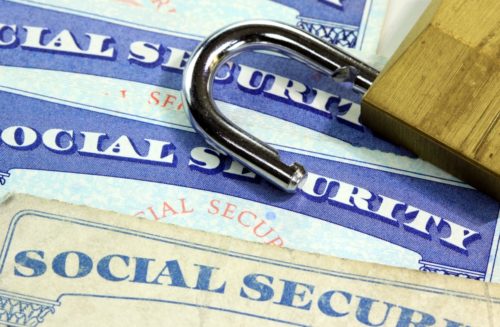It’s late at night, you’re walking down a dark alley, a stranger comes out from the shadows and demands your wallet. Without hesitation, you hand it over. You have no choice. It’s a scary face-to-face encounter, but you live to tell the tale.
However, a thief now has your name, credit cards, driver’s license, address, and maybe some cash.
What’s even scarier is that a thief today doesn’t need to rob someone in a dark alley anymore to nab a victim’s credit card numbers or other account data. In fact, there are much easier ways to obtain personal information than outright robbing them.
The crime of identity theft can happen anywhere at anytime and in a variety of different ways.
Table of Contents
What is Identity Theft?
According to a report by market-research firm Javelin Strategy & Research, there was a new identity fraud victim roughly every two seconds in 2013. Identity fraud is the “unauthorized use of another person’s personal information to achieve illicit financial gain,” according to the firm. Identity theft can range from making fraudulent purchases with a stolen credit card to opening new accounts to taking over someone’s identity.
Identity thieves will do whatever they can to illegally gather personally identifiable information, including everything from sifting through garbage cans and stealing mail to more high-tech methods, including skimming debit card numbers and breaching corporate databases.
Once the criminal has your personal info, they can wreak havoc. Unfortunately, credit and debit card, and checking and savings accounts are no longer the only targets. After thieves steal your identity they often do the following:
- Make purchases or order products with your credit or debit card
- Use your name to apply for credit
- Open financial institution accounts
- Apply for loans
- Apply for government advantages, such as social security benefits
- Obtain cable, cell or utility services using the victim’s name
- Forge checks or financial institution drafts
- Use victim’s accounts to obtain cash via wire transfers
- Obtain employment
What are the Impacts of Stolen Identity?
Identity theft is insidious because the effects don’t show up immediately. If you become the victim of identity theft, it can cause severe damage to your finances and your good name, especially if you do not find out about it immediately.
Even if you do catch it quickly, you can spend months and thousands of dollars trying to repair the damage done to your credit rating.
The tricky part is you usually don’t know if your identity is compromised until it’s too late. Someone could open credit card accounts in your name, file a fraudulent tax return with your SSN, and claim your medical insurance benefits. It make take years to fix.
A Tennessee woman found out in 2015 just how damaging and disruptive stolen identity can be. Her social security benefits were canceled after a thief had used her SSN to file a fake tax return. Her social security check was her only source of income. The IRS even confirmed she was a victim, but initially thought she lied about being disabled after the false tax return came in.
Another way credit cards get compromised is through a company’s database. For example, in 2013, 40 million credit and debit card accounts were compromised when hackers gained access to Target’s database.
Identity Crime Occurrence
Identity theft hit an all-time high in 2016 with an estimated 15.4 million consumers hit with some kind of ID theft, according to a report by Javelin Strategy & Research. About one in every 16 U.S. adults were victims last year (6.15 percent). Fraud losses totaled 16 billion. Identity theft is the fastest growing crime.
“After five years of relatively small growth or even decreases in fraud, this year’s findings drives home that fraudsters never rest and when one area is closed, they adapt and find new approaches,” Al Pascual, senior vice president, research director, and head of fraud & security, Javelin Strategy & Research, stated in a press release.
How to Prevent Identity Theft
With millions of Americans getting hit with fraudulent activities, public awareness is high. News stories cover this topic every single day, and campaigns and laws have been passed to combat identity theft.
Consequently, it is important in today’s electronic age to protect your information as best you can. Unfortunately, there are thieves out there just waiting for you to make a mistake or get careless.
There are different ways that identity thieves go about stealing the personal information of others. Here are ways for you to avoid becoming a victim:
- Don’t carry your social security card in your wallet. You’d be amazed how many people do this. Only give the number out when absolutely necessary. Ask if there’s an alternative way for you to prove your identity. Again, many people don’t think twice about freely give out their social security number. Store all important documents in a safe place, this includes your and your family’s social security cards.
- Pay attention to your accounts and billing cycles. Review your receipts and compare them to your account statements. Watch for unauthorized transactions.
- Shred receipts and credit card offers and other paperwork you don’t need but that could contain personal information.
- Don’t leave your mail in the mailbox. If you are away, put your mail on hold until you return.
- Be vigilant online. Install firewalls and virus detection software on your home computer and create complex passwords that fraudsters can’t easily guess. Change passwords often, especially if a company or organization has your information and has suffered a database breach.
- Order your credit report once a year. Review it to make sure it doesn’t include accounts you have not authorized. Check it more frequently if you suspect someone has gained access to your account information.
- Contact your bank or credit union to determine how they can help in the event of fraud or identity theft.
Identity Theft Recovery
A victim of identity theft should contact the correct organization, such as the bank, credit card company, health insurance carrier or the IRS, to inform them of the situation.
You can freeze your credit for free and up to three months to prevent someone from opening accounts in your name. It’s easy to do. To place a fraud alert on your credit reports, contact fraud.transunion.com, who will then forward your request to Equifax and Experian. By law, you are also allowed to get one free credit report a year. Look for sudden or unexpected changes in your free credit report summary, which is updated every month on annualcreditreport.com.
If you think you’ve been a victim of fraud or identity theft, file a complaint with the Federal Trade Commission.
In 2015, the FTC reported more than 490,000 in identity theft complaints. Every year, the threat continues to grow as advancements in technology uncover vulnerabilities that could allow fraudsters to get your personal information.
Looking for more ways to lock down your credit card account and prevent identity theft? Visit our credit card resource center.
Image Source: https://depositphotos.com/





